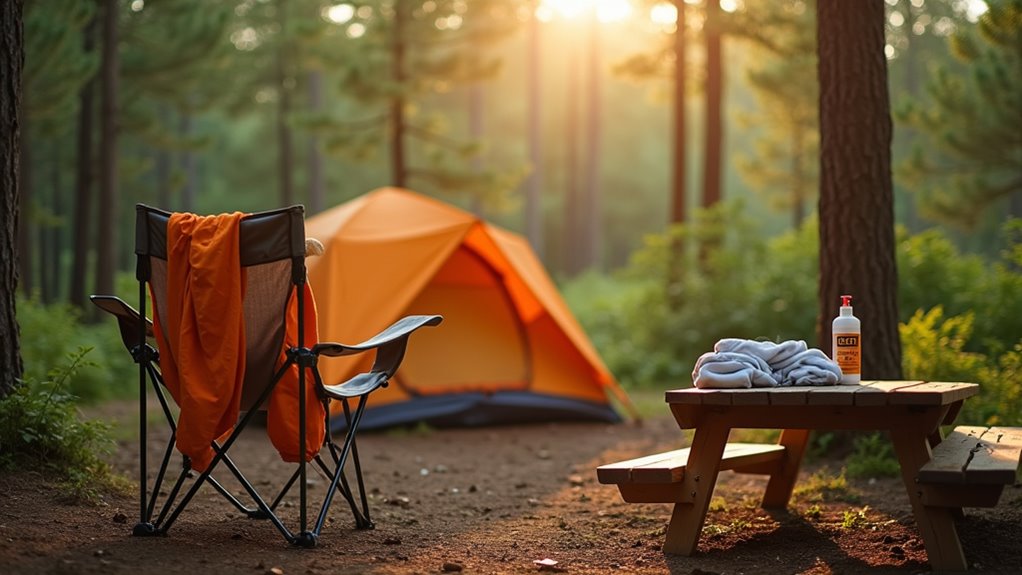Physical Address
304 North Cardinal St.
Dorchester Center, MA 02124
Physical Address
304 North Cardinal St.
Dorchester Center, MA 02124

How to create an impenetrable barrier against disease-carrying ticks while camping using gear most outdoor enthusiasts choose incorrectly.
You’ll want to armor yourself properly before heading into tick territory, and it starts with your clothing choices. Long pants tucked into socks might look awkward, but they’re your first line of defense against these disease-carrying parasites. Light-colored fabrics help you spot ticks quickly, while permethrin-treated gear creates a chemical barrier that’ll stop them in their tracks. But clothing protection is just the beginning—there’s a specific strategy for choosing repellents that most campers get completely wrong.

While tick encounters are inevitable in most camping areas, you don’t have to become their next meal. These tiny bloodsuckers lurk in tall grass, brush, and wooded areas where campers love to explore, but smart preparation and awareness will keep you bite-free.
Your clothing becomes your first line of defense. Wear long pants tucked into socks and long-sleeved shirts, even when it’s warm. Light-colored clothing helps you spot ticks easily before they find skin. Treat your gear and clothes with permethrin-based repellent before your trip – it’ll kill ticks on contact and last through multiple washes.
Light-colored, long-sleeved clothing tucked into socks and treated with permethrin creates an effective barrier against tick encounters.
Apply DEET-containing repellent to exposed skin, focusing on ankles, wrists, and neck where ticks commonly attach.
Choose your campsite wisely. Avoid areas with tall grass, dense brush, or leaf litter where ticks thrive. Set up camp in sunny, dry spots away from game trails that deer and other tick-carrying animals frequent. Keep your tent zipped shut and shake out sleeping bags and clothes before using them.
When hiking or exploring, stick to the center of trails instead of brushing against vegetation. Ticks can’t jump or fly – they climb onto passing hosts from grass and shrubs.
After any outdoor activity, perform thorough tick checks on yourself and companions. Check hairlines, behind ears, underarms, waistbands, and between toes where ticks prefer to hide.
Your camping routine should include daily full-body inspections using a mirror or buddy system. Ticks often crawl around for hours before attaching, so catching them early prevents bites entirely.
Shower within two hours of outdoor activities when possible, as this removes unattached ticks and provides another opportunity for detection.
If you find an attached tick, remove it immediately using fine-tipped tweezers. Grasp the tick close to your skin’s surface and pull upward with steady pressure – don’t twist or jerk.
Clean the bite area with rubbing alcohol or soap and water afterward.
Pack a tick removal kit containing tweezers, antiseptic wipes, and a magnifying glass. Some campers swear by duct tape for removing unattached ticks from clothing and gear.
Keep a sealed container or tape to preserve any ticks you remove for identification if symptoms develop later.
Prevention beats treatment every time. Ticks carry serious diseases like Lyme disease and Rocky Mountain spotted fever, making vigilance essential.
With proper clothing, repellent, campsite selection, and regular checks, you’ll enjoy tick-free camping adventures. Don’t let these tiny pests ruin your outdoor experiences – stay prepared and stay protected. Many camping enthusiasts who enjoy rock climbing should be especially vigilant about tick prevention since climbing often involves contact with rocky areas where vegetation and tick habitats are common.
You’ve got the knowledge, you’ve got the gear—but here’s the thing most campers forget. Even with perfect preparation, one missed tick check could change everything. That tiny crawler you didn’t spot behind your ear? It’s already settling in for the night. Don’t let your guard down when you think you’re safe. The real test isn’t just preventing bites—it’s staying vigilant every single moment you’re outdoors. Your health depends on it.